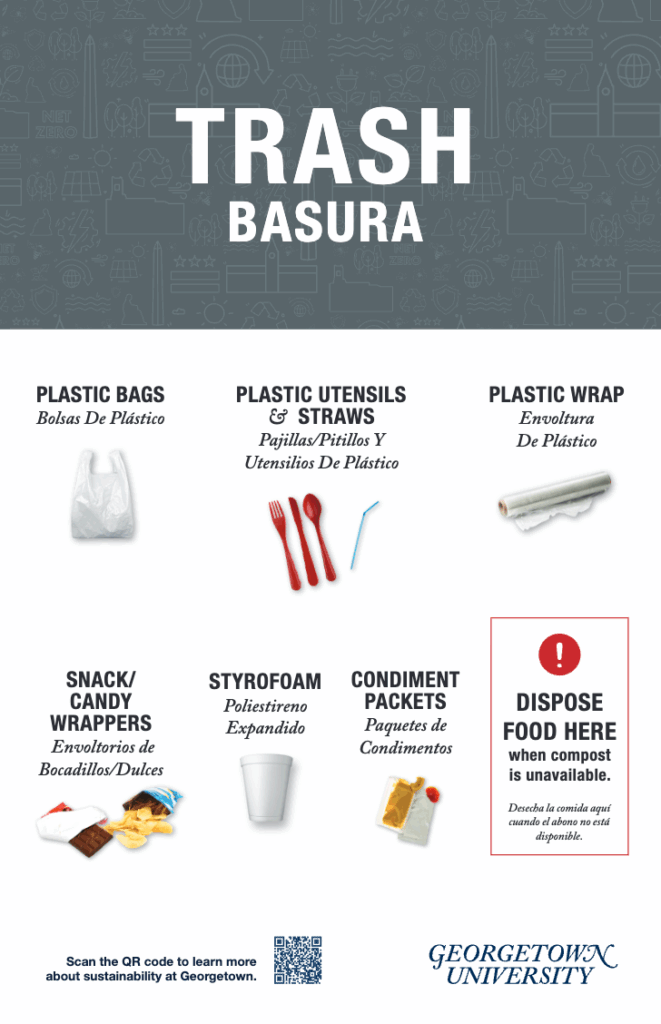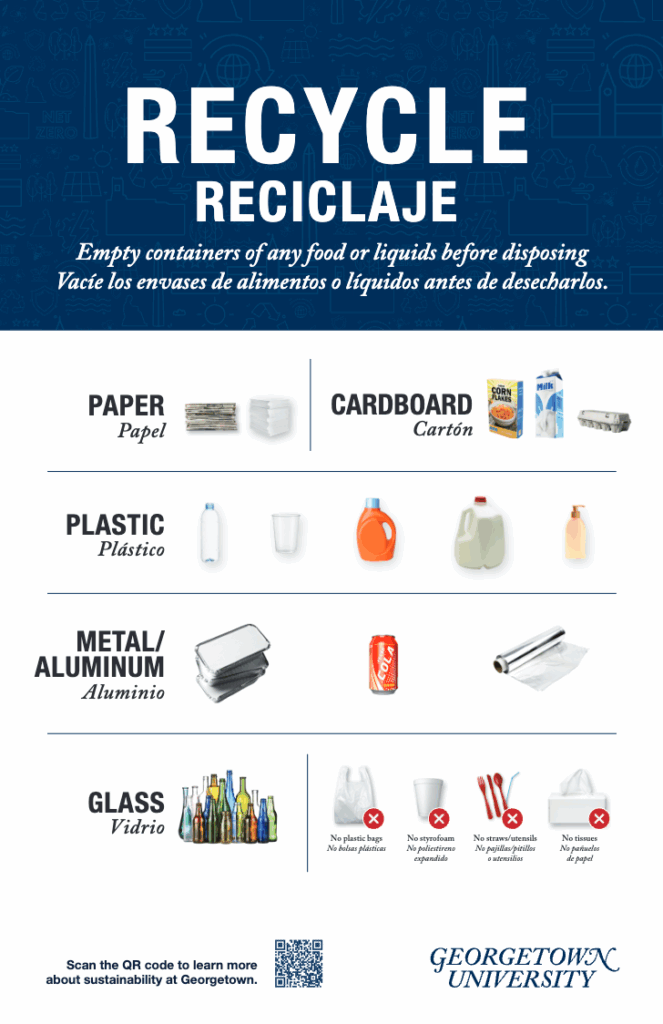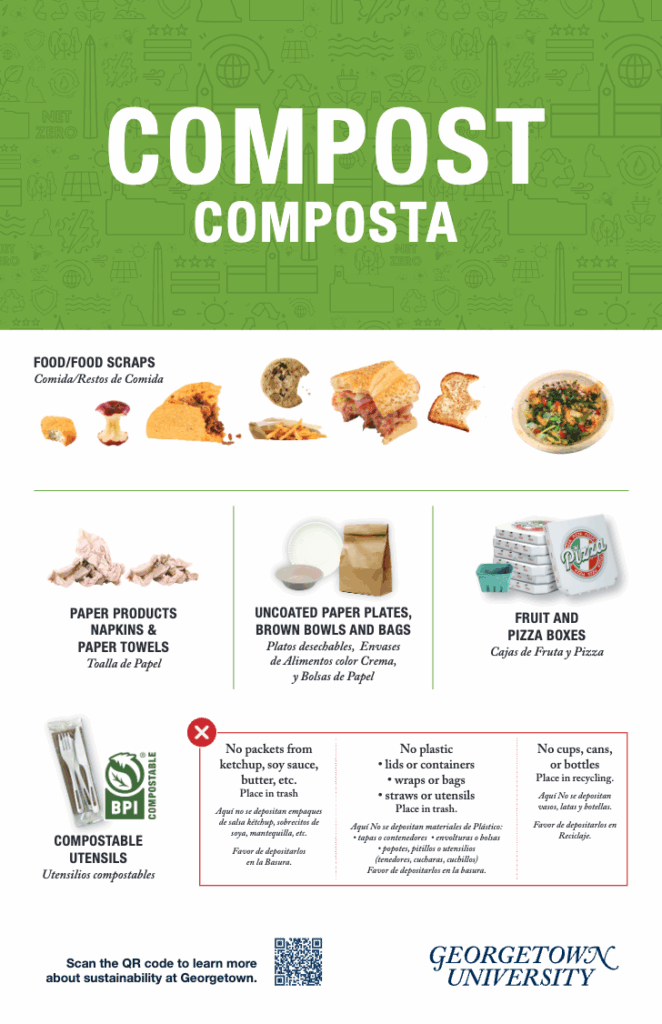Sustainable Practices at Georgetown
Georgetown is committed to sustainable waste management. With your help, we can reduce the amount of waste we send to the landfill. Students, faculty, staff, and visitors can recycle and compost much of your personal and office waste generated on campus. Explore the information below to find out what and how.
Help lead Georgetown towards a more sustainable future by doing your part in sorting your waste on campus!
Trash
Trash is any non-recyclable or non-compostable material. Some examples are:
- Styrofoam
- Condiment Wraps
- Chip Bags
- Plastic Utensils
Recycling
Single Stream/Mixed Recycling
Georgetown uses a single-stream/mixed recycling system, which means all common recyclable materials (except for corrugated cardboard) should be placed in the same bin. This shift aims to simplify recycling for our University community members and reduce contamination in the waste stream. Please help Georgetown recycle properly by always following the labels on the bins!
How Recycling Shows Up On Campus
Recycling is available throughout Georgetown’s campus in various locations and buildings. Below are examples of how bins look in different spaces:
- Residential Halls
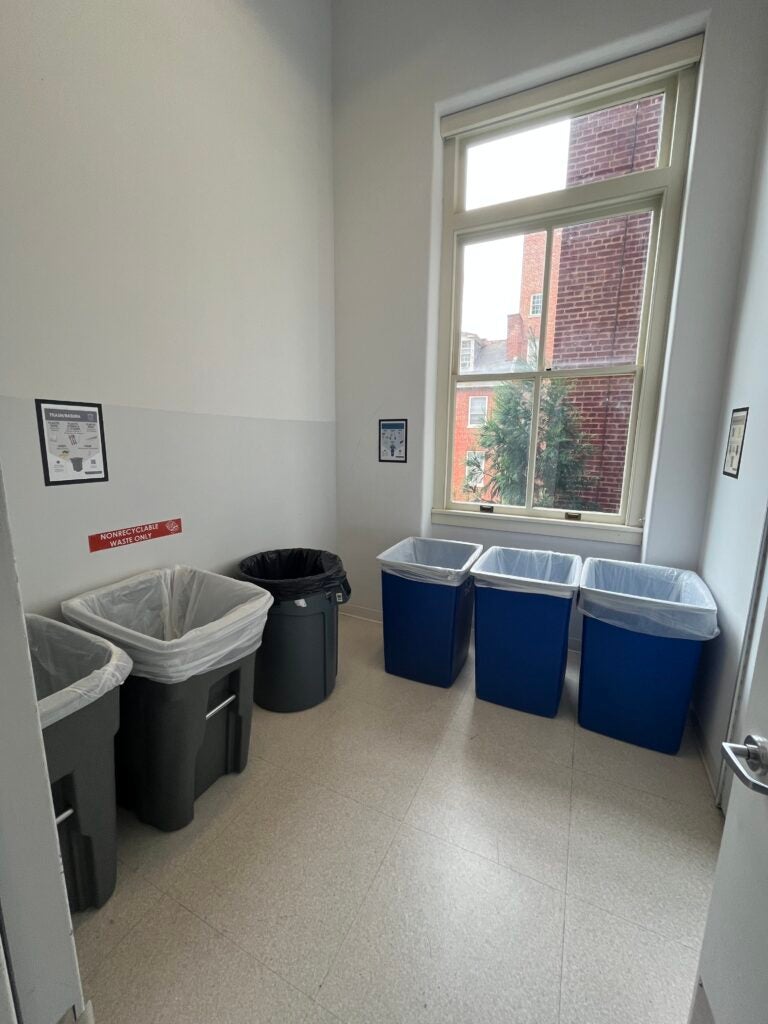
- Hallways
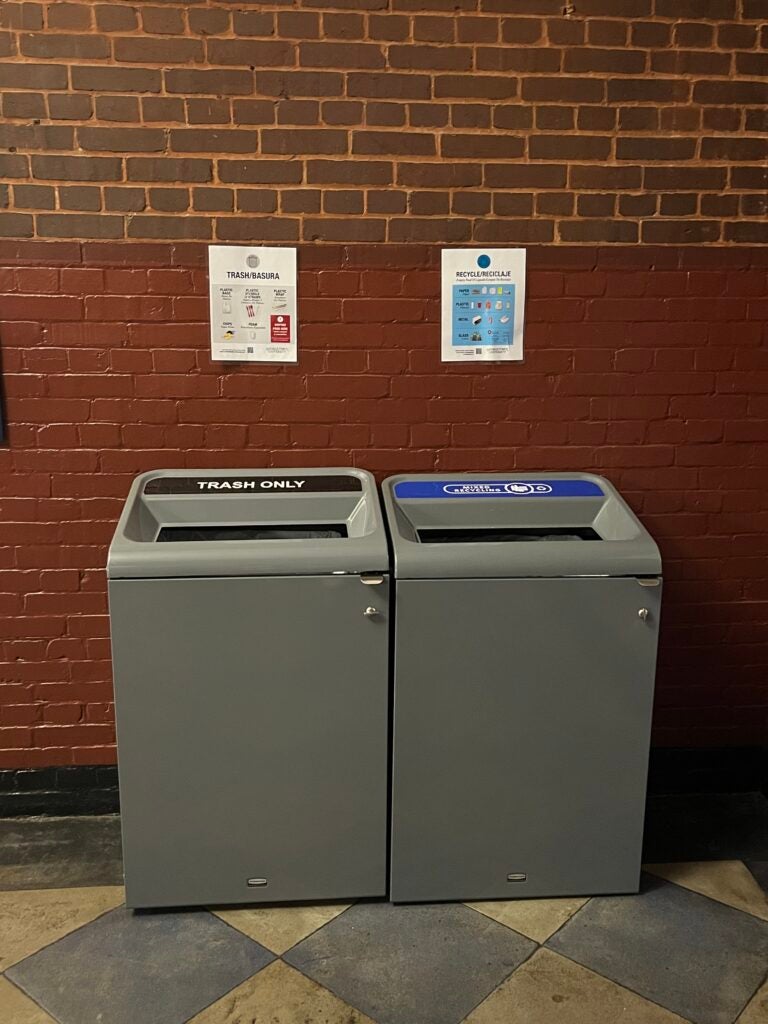
- Big Bellies
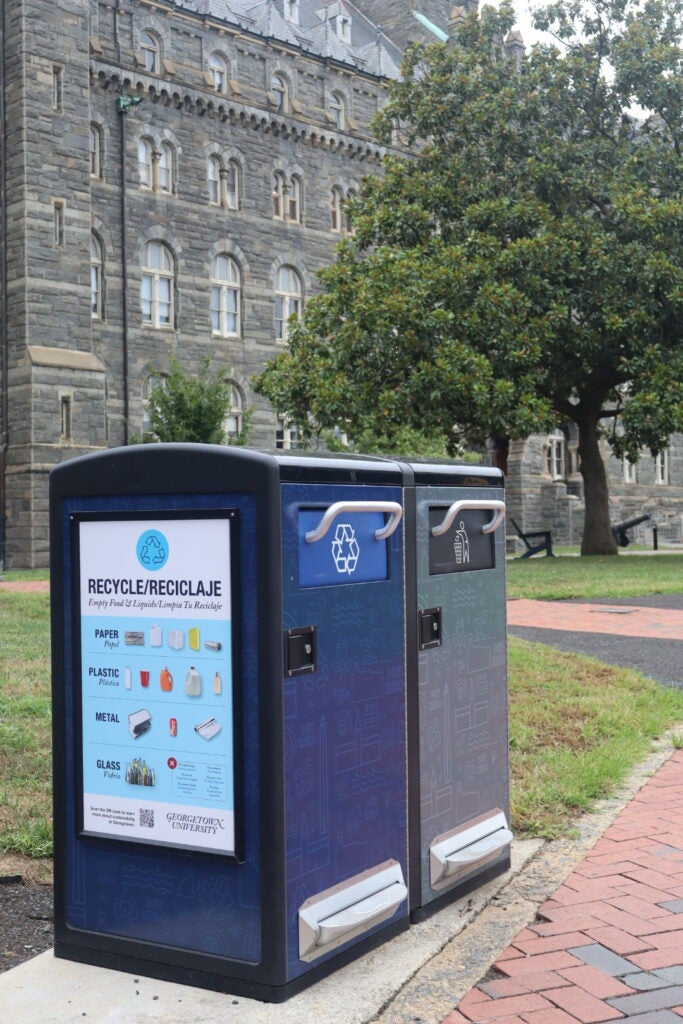
- Medical Center
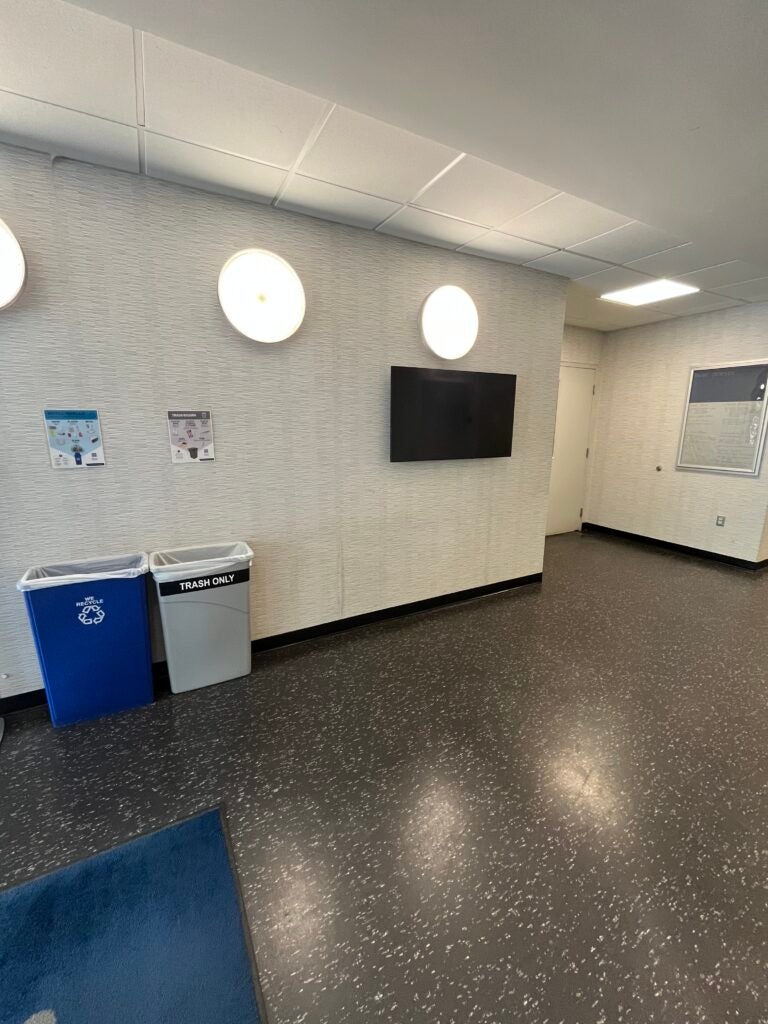
Recycling at Events
Contact Facilities Management by submitting a work order or emailing facilities@georgetown.edu to request recycling containers. If you will be serving food and beverages in recyclable containers, feel free to make an announcement directing guests to the recycling bins. Make sure that recycling bins are clearly label with the appropriate signage. Ensure that you coordinate with your catering staff to ensure they use the bins correctly.
What Items CAN Be Recycled?
Single-Stream/Mixed Recycling
The following items can be recycled in Single-Stream/Mixed Recycling:
- Aluminum Cans
- Glass Bottles
- Plastic Bottles
- Plastic Lids
- Plastic Cups
- Plastic Containers
- Unwaxed Cups and Containers
- Flattened Cardboard (not corrugated) – must be flattened and placed in designated cardboard recycling areas
- Milk, Juice, & Soup Cartons
- Books, including Phone Books
E-Waste
Cell Phones
- Old cell phones and PDAs (including their batteries and peripheral items like cords) can be recycled using the same process for computers. Be sure to remove all personal information and data before recycling your old phone.
Computers & Data Storage Drives
- Students can recycle your old computers through Facilities Management, which sends discarded computers to be recycled at a certified facility.
- Students can recycle your personal laptops and desktops, as well as external hard drives, other data-storing devices, and other electronics, by dropping your items off at the Regents Hall Garage. The Regents Hall Garage is located on the 1st floor of Regents past the elevators, through the double doors, and down the hallway. There are large containers labeled for computers and peripherals.
Remember to back up any data you wish to keep before recycling your university computers!
- University computers are recycled through UIS. Contact your departmental tech staff or call the UIS Help Desk to initiate this. More information is available here: https://uis.georgetown.edu/computers/replacement-program/disposal
Other Electronics
Faculty, staff and students can recycle the following types of electronics:
- Flat Monitors
- CRT Monitors (Cathode Ray Tube)
- All Televisions (CRT/DLP/LCD/LED,
- Magnetic Data Tape Cartridges
- Mixed Media (Recorded CDs, DVDs)
- Floppy Disks, VHS tapes, etc.)
- Large Copiers, Printers, Plotters
To recycle household and office electronics:
- Then, please submit a work order through Facilities Management to request a pick-up for the items at your office. There may be a small fee for pick up.
- OR, you can deliver the items to the Regents Hall Garage and place them in the large containers marked for electronics.
Working electronics in good shape with all cords and parts can also be donated through the annual Move Out Drive.
Bulk Waste
Furniture (Staff/Faculty)
Coming Soon
Bulk Metal
Georgetown can provide for the recycling of all types of bulk metal including mixed steel, stainless steel, aluminum, cast iron, brass, copper, machinery and equipment. Please place a Work Order through Facilities Management to arrange for pick up and disposal.
Ink Jet and Toner Cartridges
Ink-jet and toner cartridges can be recycled at the Regents Loading dock
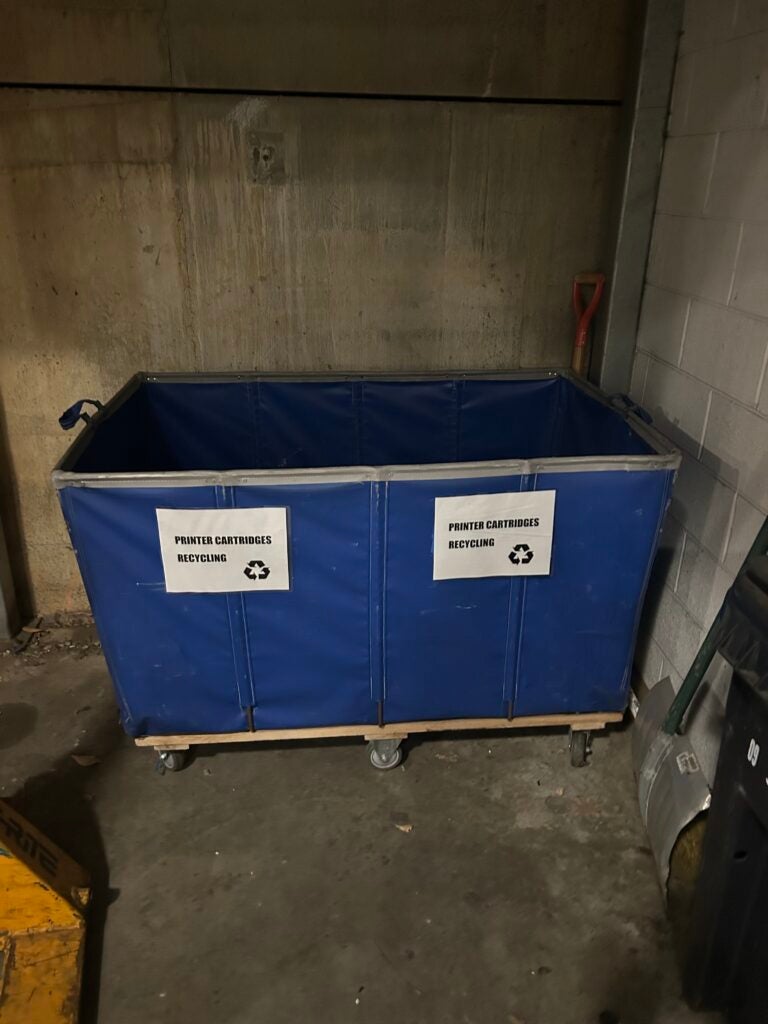
Hazardous Waste Material
For managing hazardous waste in the laboratories, please refer to Georgetown University Laboratory Hazardous Waste Management Procedures. For managing hazardous waste in other area, please contact EH&S office at 7-7172 or safetyfirst@georgetown.edu. Below are examples of some hazardous waste materials:
- Pesticides
- Mercury-Containing Equipment
- Lamps
- Aerosol cans
- Regulated Medical Waste (RMW) (Waste from hospitals and/or research facilities)
- Pathological Waste (Human and/or animal waste)
Batteries
The Office of Sustainability, in partnership with The Planning and Facilities Management Department, has recently launched a battery recycling pilot. Battery recycling boxes are located across campus in the LXR lobby, the Healy Family Student Center, the Kennedy Hall Lobby, the PFM copy room, the Environmental Health and Safety Office, and the Student Services Center. Learn more about how you can recycle batteries at Georgetown
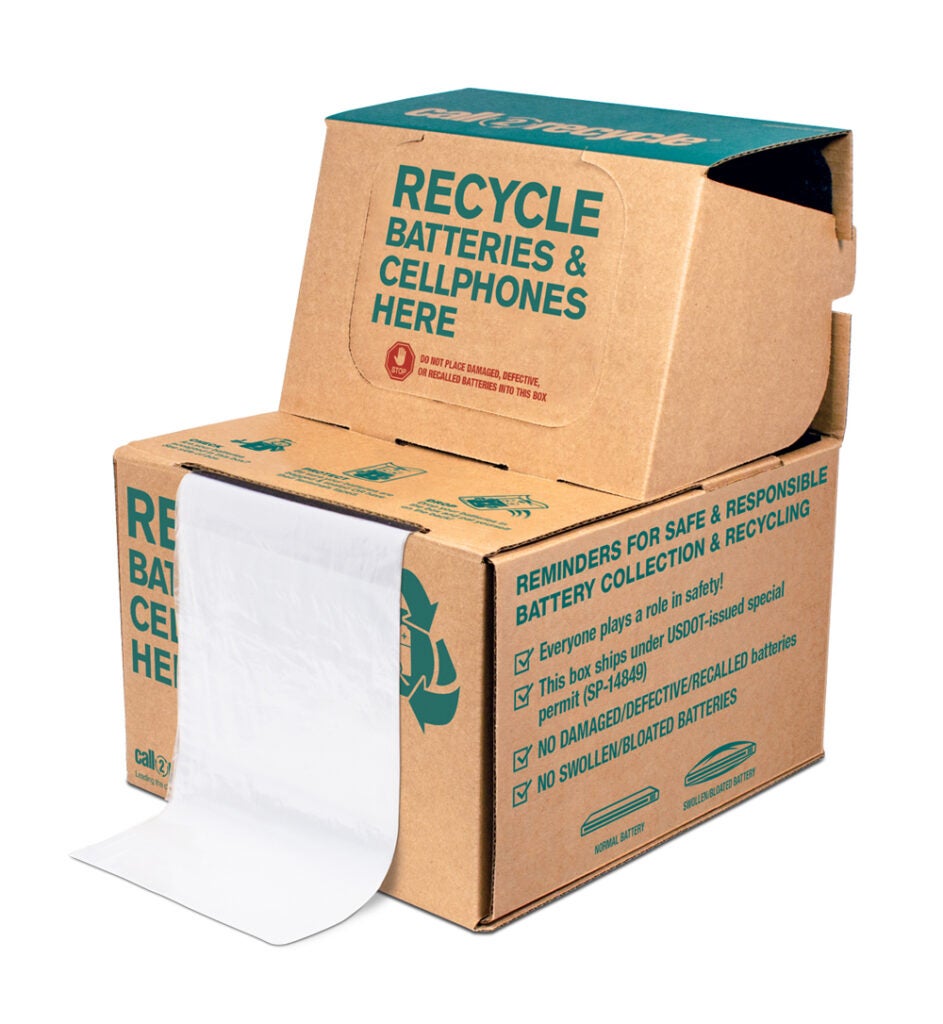
Plastic Film
The Office of Sustainability has initiated a plastic film recycling pilot program at select locations on campus. These pilot locations are currently not open to the public. If your department at Georgetown uses large quantities of plastic film and would benefit from a publicly accessible plastic film recycling box, please reach out to Meg Friedman at mef297@georgetown.edu
We are assessing interest and demand for this service. The successful completion of the pilot program will guide future expansion.
If your office or department operates one of our pilot recycling boxes and needs assistance, please submit a work order to Facilities Management or email facilities@georgetown.edu
Paper (Confidential)
Papers of a sensitive or confidential nature must be shredded prior to being recycled. Currently, this is handled through a private a shredding company and administered through the Planning and Facilities Management Department. The cost of shredding is charged to the office that utilizes the service based on the amount of paper being discarded. To set up a one-time confidential shredding pick-up please place a work order through Facilities Management. To set up a recurring shredding service, please contact Facilities Management at facilities@georgetown.edu
Collected Donations
Furniture (Students)
Students who wish to donate their surplus personal furniture at the end of the academic year can participate in the annual Move Out drive, which collects unwanted, reusable items in good condition to donate to charity.
Clothing
Georgetown REUSE collects clothing at most locations of The Corp. You may also contact a local charity organization to schedule a pickup or drop-off of gently used clothing, or wait until the annual Move Out Drive each May to donate your clothing. More information about recycling clothing in DC can be found at ReThread DC.
Bicycles
Bicycles are accepted for donation as part of the annual Move Out Drive.
What Items CANNOT Be Recycled?
- Unclean paper materials
- Tissues
- Unclean plastic materials
- Bags
- Straws or Utensils
- Foam Polystyrene
- Unclean metal materials
- Paint Cans
Composting
What is Compost?
Composting is the natural process of recycling organic matter, such as leaves and food scraps, into a valuable fertilizer that can enrich soil and plants. The following items can be composted:
- Fruits & Vegetables
- Meats & Dairy
- Eggs Shell
- Nuts
- Coffee & Teas
- Baked Goods/Breads
- Cartons and Pizza Boxes
- Paper Products Napkins & Paper Towels
- Leaves
- Items made entirely out of untreated, uncoated paper, or plant fiber
- Wax-coated paper for deli sheets, sandwich wraps, basket liners, straws, and other similar wax-coated items
- Any items certified by the Biodegradable Products Institute
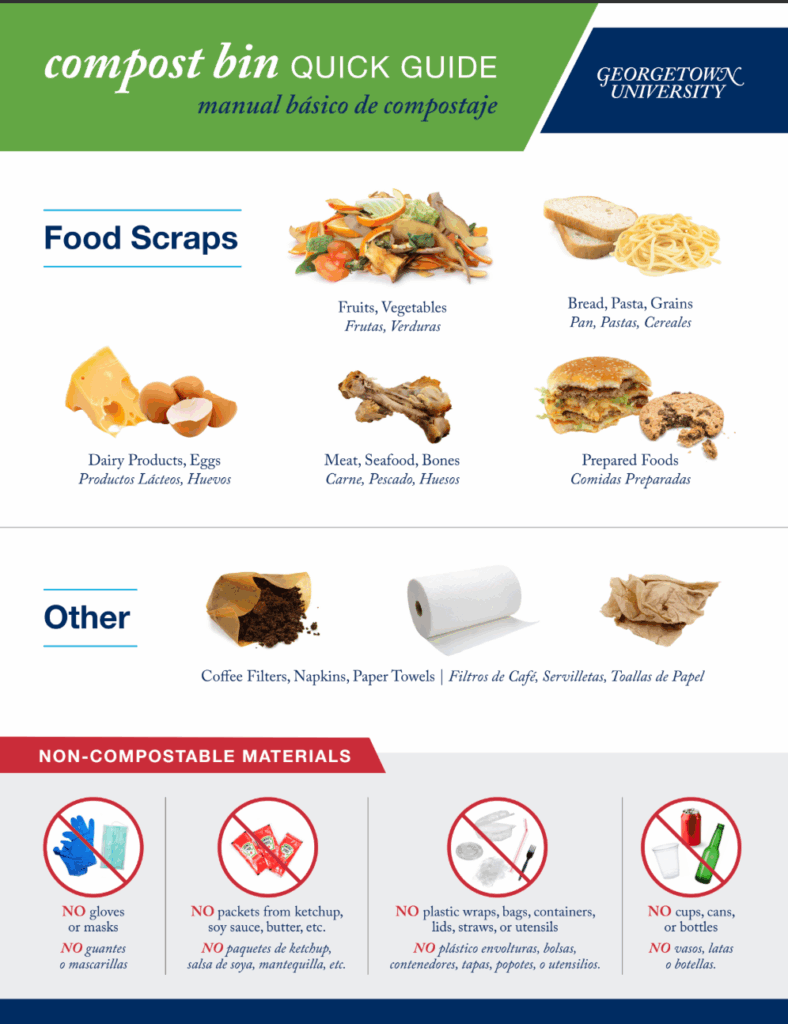
Composting on the Hilltop Campus
Composting was officially launched at the Hilltop campus of Georgetown University in March 2023. You can compost at these two locations on the Hilltop Campus:
- Leo O’Donovan Dining Hall (1290 Tondorf Rd, Washington, DC 20057)
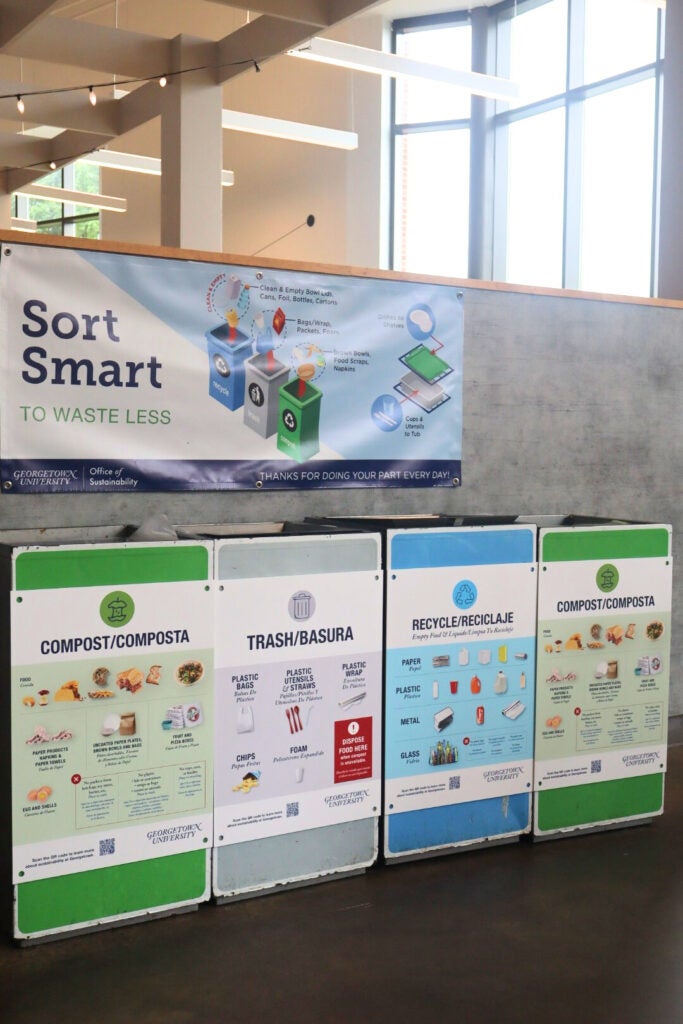
- Epicurean Dining Hall (3800 Reservoir Rd NW, Washington, DC 20007)
- Exterior Compost Bins (Front Gates, Red Square, Hoya Harvest Garden, Medical Pavilion)
At these locations, not only can you compost the remains of your recent meal, but you can also contribute by bringing compost from your residential halls, offices, and small events!
Composting on the Capitol Campus
Currently, there are two locations on the Capitol campus that Georgetown community members can compost:
- McCourt School of Public Policy (125 E St NW, Washington, DC 20001)
- 2nd Floor Common Café
- 3rd Floor Commons
- 4th Floor Student Lounge
- 5th Floor Copy/Pantry Room
- 6th Floor Faculty Lounge
- 7th Floor Mar Family Lounge
- 111 Mass Ave (111 Massachusetts Ave NW, Washington, DC 20001)
- Kitchen, Pantries, Hallway built-ins, & Lounges on Floors 3-8
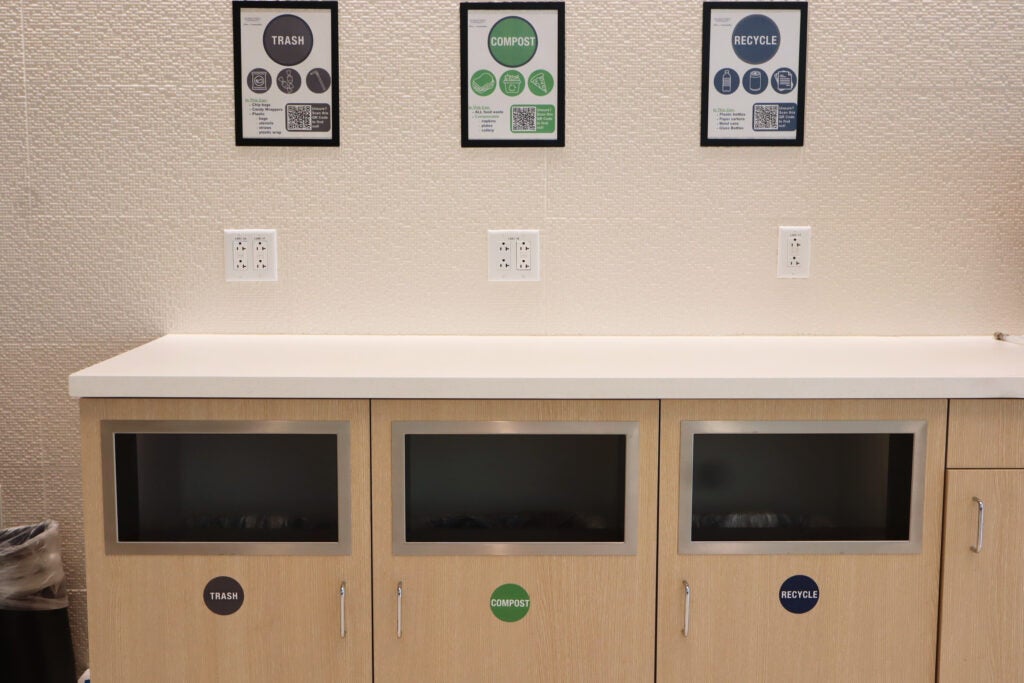
3rd Floor Commons at the McCourt School of Public Policy (125 E St)
Composting For Events
Whether large or small, if you plan on having an event on campus with food, we encourage event organizers to have three-bin waste sorting readily available at your event. Food and selected serving ware and utensils can be compostable. Check out our Sustainable Event Supplies Guide for information on where to purchase these sustainable event supplies. Interested in having a fully sustainable event? Check out our Sustainable Events Planning Guide!
Small Events– Less than 50 People
For small events, individuals can utilize paper bags or compostable trash bags to collect food and compostable service ware. Ensure this bin or bag is clearly labeled to indicate where attendees should dispose of their waste for composting. At the end of your event, please bring your compost to the listed locations at the Hilltop and Capitol campuses during operating hours.
Large Events– More than 50 People
To request a compost or recycling bins, please select “Trash Removal” under GEMS/SPE | Equipment. If you would like to have volunteers present to help sort waste at your event, email sustainability@georgetown.edu
Include these instructions below in your EMS request:
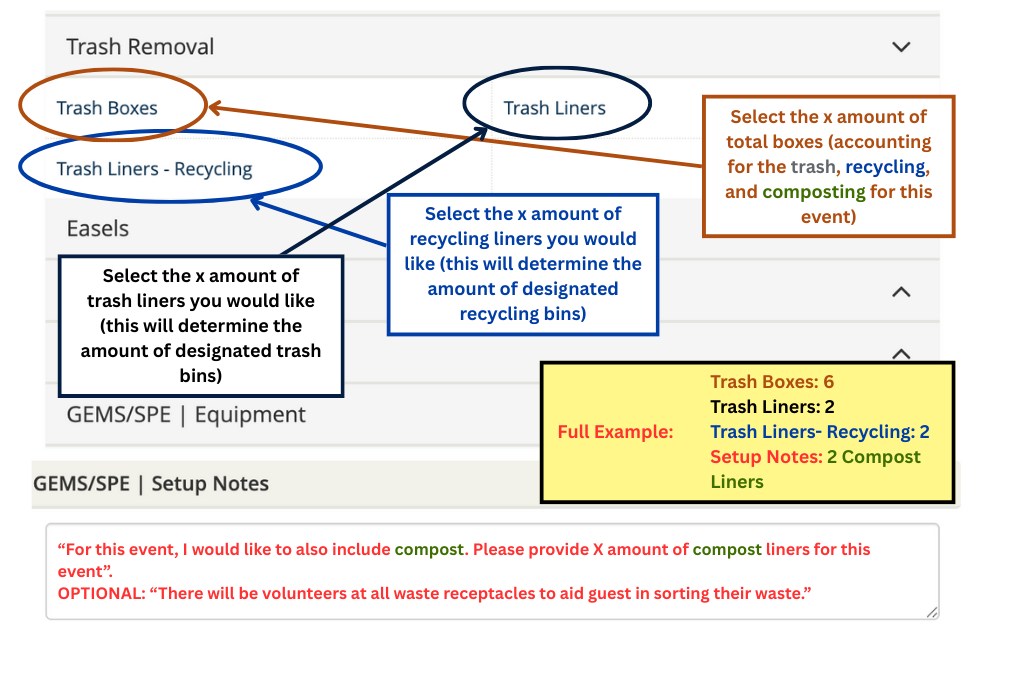
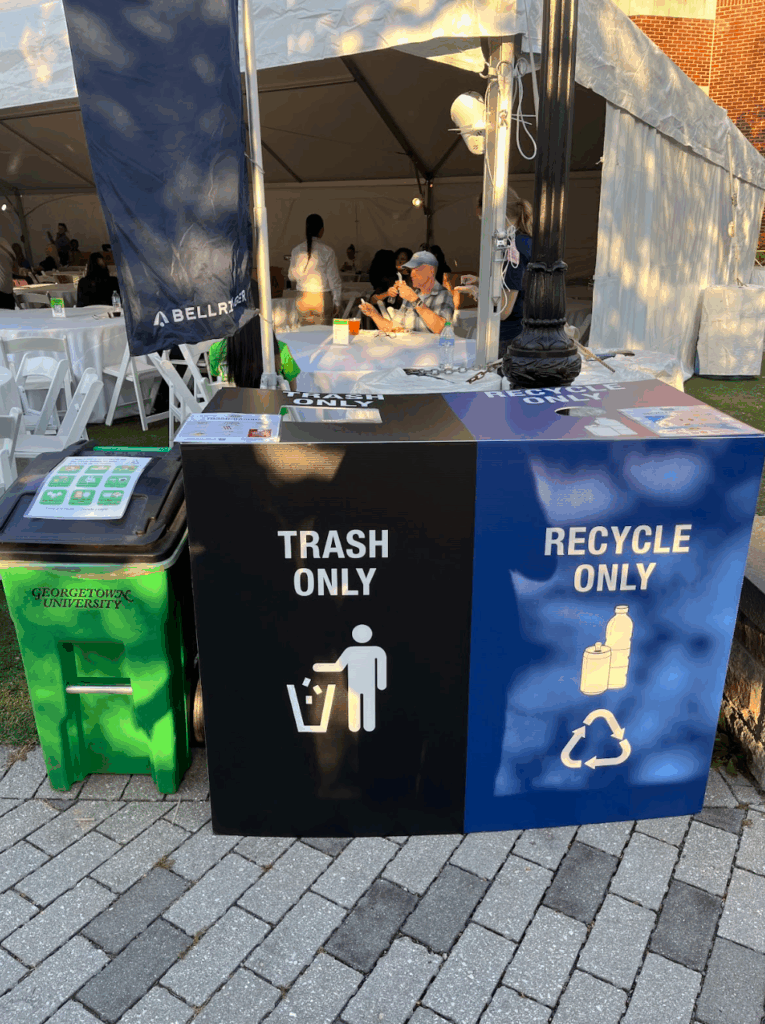
Compost, Trash, and Recycling Present At Bellringer Fall 2024
What Items CANNOT Be Composted?
The following items CANNOT be composted:
- No packets from ketchup, soy sauce, butter, etc.
- No plastic lids or containers, wraps or bags, straws or utensils
- No plastic cups, aluminum cans, or glass bottles
- Lotion, shampoo, conditioner and body wash
- Cosmetics
- Hygiene products (unless otherwise stated on package)
- Gasoline or petrol, oil, and lubricants
- Glue and tape
- Charcoal ashes (unless natural lump charcoal)
- Produce stickers
- Chewing gum
- No invasive weeds/plants
Waste Management at Georgetown FAQs
My Office/Suite/Bedroom/Floor Does Not Have A Recycling Bin. How Can I Request One?
Facilities Management
facilities@georgetown.edu
Submit a Work Order
